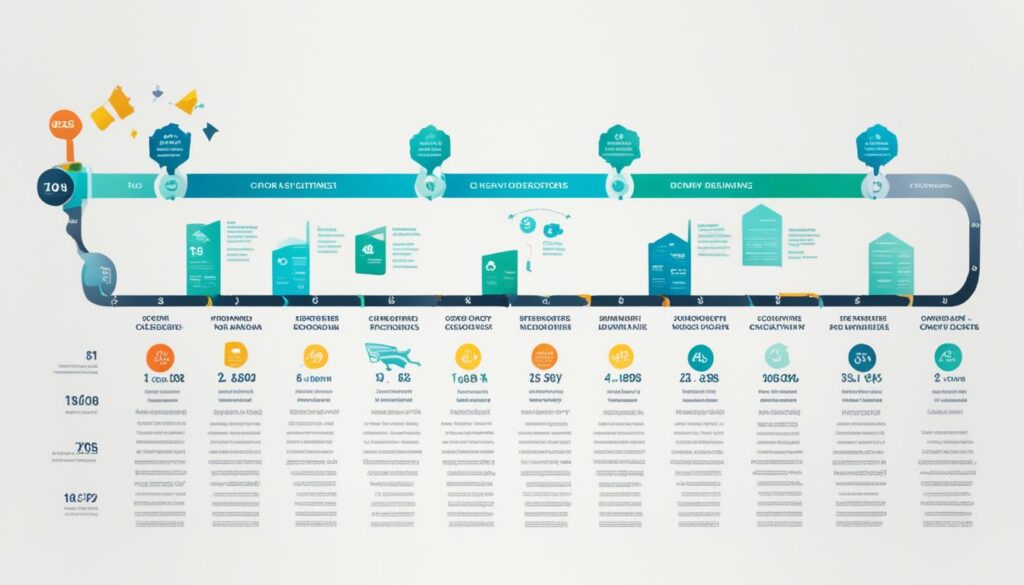As data privacy regulations continue to evolve and become more stringent, marketers are facing significant shifts in the way they approach their marketing strategies. The changing landscape of data privacy, driven by evolving online privacy regulations and growing consumer concerns, is prompting a return to core marketing fundamentals. This shift requires marketers to reassess their approach to data collection, targeting, and personalization in order to navigate the challenges of the evolving marketing landscape.
Key Takeaways:
- With the increasing focus on data privacy, marketers need to adjust their strategies to build and maintain trust with consumers.
- Transparency about data collection practices and compliance with privacy regulations are crucial to establishing consumer trust.
- Marketers should focus on core marketing fundamentals such as brand storytelling, community building, and customer experience.
- Staying informed about the latest privacy regulations is essential for navigating the evolving privacy landscape.
- Building consumer trust in the digital age requires transparency, ethical data practices, and a strong brand reputation.
The Impact of Data Privacy Changes on Marketing Strategies
As data privacy regulations become increasingly stringent, marketers are forced to adapt their strategies to maintain consumer trust and ensure data protection. This shift in the marketing landscape requires transparency, stricter data security measures, and a focus on building first-party data sources.
Transparency and Compliance
To build and maintain consumer trust, marketers must be transparent about their data collection practices and compliance with privacy regulations. Clear communication about data usage and obtaining explicit consent from consumers are essential in establishing trust.
Stricter Data Protection Measures
Implementing stronger data protection measures, such as encryption and secure storage, is crucial in safeguarding consumer data. By prioritizing data security, marketers can build consumer trust and mitigate risks associated with data breaches.
Rethinking Reliance on Third-Party Data
With evolving privacy regulations, marketers should reconsider their reliance on third-party data and focus on building their own first-party data sources. Direct customer interactions can provide valuable insights and foster a deeper understanding of consumer preferences.
| Benefits of Adjusting Marketing Strategies | Challenges of Adjusting Marketing Strategies |
|---|---|
| Enhanced consumer trust and loyalty | Initial investment in stricter data protection measures |
| More accurate targeting and personalization | Redistribution of marketing budgets to focus on first-party data |
| Compliance with privacy regulations | Adapting to changing consumer behavior |
Adapting marketing strategies to data privacy changes is essential for long-term success. By prioritizing transparency, data protection, and building first-party data sources, marketers can navigate the evolving privacy landscape and maintain consumer trust.
Stay tuned for Section 3, where we explore the return to marketing fundamentals in light of data privacy changes.
The Return to Marketing Fundamentals
As data privacy regulations limit the ways in which marketers can collect and utilize consumer data, there is a renewed focus on marketing fundamentals. Marketers are turning to core principles such as brand storytelling, community building, and customer experience to engage consumers in a meaningful way.
“ Brand storytelling, community building, and customer experience are the key ingredients to connect with consumers on a deeper level and build long-lasting relationships. ”
By creating authentic, compelling narratives and fostering a sense of community around their brand, marketers can connect with consumers on a deeper level and build long-lasting relationships. This shift towards marketing fundamentals emphasizes the importance of delivering value and engaging experiences to consumers, rather than relying solely on data-driven personalization.
The Power of Brand Storytelling
Brand storytelling is a powerful tool that allows marketers to communicate their brand’s values, mission, and unique selling proposition in a compelling way. By crafting narratives that resonate with their target audience, marketers can forge an emotional connection and establish a memorable brand identity.
Building Communities for Consumer Engagement
Community building plays a vital role in creating a sense of belonging and fostering trust among consumers. By cultivating online and offline communities around their brand, marketers can provide a platform for like-minded individuals to connect, share experiences, and engage with the brand on a deeper level.
Elevating the Customer Experience
Customer experience has become a key differentiator in the marketplace. By prioritizing exceptional customer service, personalized interactions, and seamless experiences across all touchpoints, marketers can create a positive and memorable journey for their customers, leaving a lasting impression.

Navigating the Evolving Privacy Landscape
The privacy landscape is constantly evolving, driven by new online privacy regulations and changing consumer expectations. As marketers, it’s crucial to stay informed about these developments and adapt our strategies to comply with the evolving privacy landscape. By doing so, we can build consumer trust and ensure data security, which are essential for maintaining a positive reputation and fostering meaningful relationships with our audience.
One of the key aspects of navigating the evolving privacy landscape is staying up-to-date with the latest online privacy regulations. For example, the General Data Protection Regulation (GDPR) in Europe and the California Consumer Privacy Act (CCPA) in the United States have significantly impacted how businesses collect and use consumer data. Marketers need to familiarize themselves with these regulations and ensure they are in compliance to avoid legal issues and penalties.
Implementing stricter data security measures is another vital step in navigating the evolving privacy landscape. This includes adopting encryption techniques, secure storage methods, and robust access controls to protect consumer data from unauthorized access and breaches. By prioritizing data security, marketers can demonstrate their commitment to safeguarding consumer information and enhance consumer trust.
Transparency and clear communication about privacy policies are essential to building and maintaining consumer trust. Marketers should provide consumers with easily accessible and comprehensible privacy policies that outline how their data is collected, used, and protected. By ensuring transparency, marketers can instill confidence in consumers and alleviate privacy concerns.
Giving consumers control over their personal data is another crucial aspect of navigating the evolving privacy landscape. Marketers should provide options for consumers to manage their data preferences, including the ability to opt-out of certain data collection practices or request the deletion of their data. This empowers consumers and demonstrates a commitment to respecting their privacy rights.
Overall, as the privacy landscape continues to evolve, marketers must prioritize data security, adhere to online privacy regulations, foster transparency, and empower consumers. By doing so, we can navigate the evolving privacy landscape, build consumer trust, and ensure the long-term success of our marketing efforts.
“Navigating the evolving privacy landscape is not just about compliance, but also about building a relationship of trust with consumers.”
Building Consumer Trust in the Digital Age
In an era of growing data privacy concerns, building consumer trust has become paramount for marketers. Consumers want to feel confident that their personal information is being handled ethically and transparently. By prioritizing data transparency, ethical data practices, and brand reputation, marketers can cultivate trust and establish strong relationships with their customers.
One of the key elements in building consumer trust is data transparency. Marketers must be open and honest about their data collection and usage practices. This involves clearly communicating to consumers how their data is being collected, stored, and used. By providing this information, marketers demonstrate their commitment to protecting consumer privacy.
Ethical data practices also play a crucial role in building trust. Marketers should obtain explicit consent from consumers for data collection and usage. This means giving consumers the choice to opt in or opt out of data sharing, as well as providing them with control over their personal information. By respecting consumer preferences and privacy rights, marketers can foster a sense of trust and confidence.
Furthermore, brand reputation is closely tied to consumer trust. Marketers must establish a strong brand reputation that reflects their commitment to data ethics and consumer privacy. This includes implementing security measures to protect consumer data, partnering with reputable organizations, and adhering to relevant privacy regulations. A strong brand reputation instills confidence in consumers and establishes credibility for the marketer.
“Transparency, ethical data practices, and a strong brand reputation are the building blocks of consumer trust in the digital age.”
By focusing on these key pillars, marketers can effectively navigate the challenges of data privacy concerns and create a loyal customer base. When consumers trust a brand, they are more likely to engage with its products or services, advocate for the brand, and remain loyal over time.
To visually illustrate the importance of building consumer trust, consider the following table:
| Benefits of Building Consumer Trust | Consequences of Failing to Build Consumer Trust |
|---|---|
| Increased customer loyalty | Loss of customer trust and loyalty |
| Positive word-of-mouth referrals | Negative reviews and reputation damage |
| Higher customer retention rates | Increase in customer churn |
| Opportunities for cross-selling and upselling | Decreased sales and revenue |
As shown in the table above, building consumer trust brings numerous benefits, including increased customer loyalty, positive word-of-mouth referrals, higher customer retention rates, and opportunities for cross-selling and upselling. On the other hand, failing to build consumer trust can lead to negative consequences such as loss of customer trust and loyalty, negative reviews, reputation damage, increase in customer churn, and decreased sales and revenue.
By prioritizing data transparency, ethical data practices, and brand reputation, marketers can overcome the challenges of data privacy concerns and build deep and lasting relationships with their consumers.

Adapting Marketing Strategies to the Changing Landscape
As data privacy concerns continue to shape consumer behavior, marketers must adapt their strategies to meet the changing expectations of their audience. One key shift is moving away from personalized, data-driven marketing approaches and instead focusing on content marketing and value-driven strategies.
By shifting the focus to content marketing, marketers can provide consumers with engaging and valuable content without relying heavily on personal data. This approach allows brands to connect with their target audience on a deeper level by creating high-quality content that resonates with their interests and needs.
Content marketing involves creating and sharing informative, entertaining, and educational content such as blog posts, videos, and infographics. Rather than bombarding consumers with personalized advertisements, content marketing aims to provide genuine value and establish a relationship of trust and loyalty.
By adapting marketing strategies to the changing privacy landscape, brands can continue to connect with consumers effectively while respecting their privacy concerns. This approach aligns with consumer preferences for transparency and ethical data practices, enhancing brand reputation and ultimately driving positive business outcomes.
Personalization vs. Content Marketing: Key Considerations
While personalization has been a dominant marketing strategy in recent years, the rise of data privacy concerns requires marketers to reconsider its use. Personalization often relies heavily on consumer data, which can pose privacy risks and erode consumer trust. Content marketing, on the other hand, focuses on delivering value through valuable and relevant content.
Here is a comparison between personalized marketing and content marketing:
| Personalized Marketing | Content Marketing |
|---|---|
| Relies on extensive consumer data | Focuses on valuable, engaging content |
| Targets individuals based on their personal information | Appeals to target audience’s interests and needs |
| Can raise privacy concerns and erode trust | Develops trust and loyalty through valuable content |
As the table demonstrates, content marketing offers an alternative approach for brands to engage consumers without relying heavily on personal data. By creating valuable content, brands can drive consumer engagement, build trust, and maintain a positive reputation.
Adapting marketing strategies to the changing landscape involves a shift towards content marketing and away from personalized marketing. By focusing on delivering valuable content that resonates with target audiences, brands can continue to connect with consumers effectively while addressing their privacy concerns.
Conclusion
The evolving landscape of data privacy is reshaping the way marketers approach their strategies. With the introduction of more stringent regulations and increasing consumer concerns, it is crucial for marketers to adapt and strengthen their marketing fundamentals to navigate these challenges successfully.
By prioritizing consumer trust, creating engaging content, and fostering a sense of community, marketers can continue to drive results in the ever-changing marketing landscape. This return to marketing fundamentals emphasizes the significance of delivering value to consumers and building meaningful connections.
In this digital age, where data privacy is a growing concern, marketers must be transparent and ethical in their data collection and usage practices. By focusing on building consumer trust and maintaining a strong brand reputation, marketers can mitigate the negative impacts of data privacy concerns and establish long-lasting relationships with their audience.
Adapting marketing strategies to the changing privacy landscape is crucial. Marketers must shift their focus from personalized, data-driven marketing to content marketing and value-driven strategies. By creating high-quality content that resonates with their target audiences, marketers can engage consumers without relying heavily on personal data. This adaptation enables marketers to continue connecting with consumers and driving measurable results, even in the face of shifting data privacy regulations.
FAQ
How are data privacy shifts impacting marketing strategies?
Data privacy shifts are forcing marketers to revisit the fundamental principles of marketing. As regulations become more stringent and consumer concerns grow, marketers must adapt their strategies to navigate these challenges and prioritize data protection.
What is the impact of data privacy changes on consumer trust?
Data privacy changes have a significant impact on consumer trust. Marketers must be transparent about their data collection practices and ensure compliance with privacy regulations to build and maintain trust with consumers.
How does the return to marketing fundamentals affect consumer engagement?
The return to marketing fundamentals emphasizes the importance of building strong relationships with consumers. By focusing on brand storytelling, community building, and customer experience, marketers can engage consumers in a meaningful way and build long-lasting relationships.
How can marketers navigate the evolving privacy landscape?
Marketers must stay informed about the latest privacy regulations and ensure compliance. This may involve implementing stricter data security measures, providing clear privacy policies, and giving consumers control over their personal data.
What are some strategies for building consumer trust in the digital age?
Building consumer trust requires transparency in data collection and usage practices. Marketers should prioritize ethical data practices such as obtaining explicit consent for data collection and usage, as well as maintaining a strong brand reputation.
How can marketers adapt their strategies to the changing privacy landscape?
Marketers can adapt by moving away from personalized, data-driven marketing and focusing on value-driven strategies like content marketing. By creating high-quality content and resonating with target audiences, marketers can continue to connect with consumers without relying heavily on personal data.
Source Links
- https://www.mckinsey.com/capabilities/growth-marketing-and-sales/our-insights/a-better-way-to-build-a-brand-the-community-flywheel
- https://www.freedomtoascend.com/marketing/marketing-channels/affiliate-marketing/affiliate-marketing-trends/
- https://www.techtarget.com/searchcio/definition/digital-transformation








